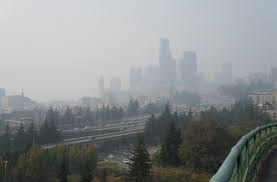To provide relief from the unhealthful air that has covered the area, the King County Regional Homelessness Authority established a smoke shelter on Tuesday. However, few people have so far taken advantage of the opportunity.
Since September 11, the organisation has activated emergency smoke shelters five times amid a period of poor air quality caused by Washington wildfires. On Wednesday afternoon, IQAir, a Swiss firm that develops air-quality equipment and runs a portal for real-time air-quality information, named Seattle as the worst city in the world for pollution and air quality.
Anne Martens, a representative for the Regional Homelessness Authority, asserted that “climate change is true” and predicted that “extreme weather occurrences will continue to escalate.”
The Seattle Times spoke with a dozen people who reside outside or in shelters on a day when the air quality was between 151 and 200, considered to be harmful. For the most, the smoke is a minor inconvenience compared to other difficulties they are dealing with.
Some claimed to be experiencing bodily symptoms, such as headaches or burning eyes. The smoking shelter, run by Compass Housing Alliance, is located at 77 S. Washington St. in Seattle’s Pioneer Square neighbourhood, but none of them were moving there.
Adults can stay overnight at the location, which also offers complimentary meals. The plan was for it to remain open until Thursday morning.
Tuesday night, thirteen people spent the night at the shelter. There were 22 people that stayed there from Friday night until Monday morning.
The area may accommodate up to 60 people and resembles a more conventional congregate shelter because there are mats on the floor and no storage facilities.
Given that, Martens said, “it’s logical that people might not want to pack up all their belongings for a temporary communal setting.
People living outside during extreme weather events are reluctant to leave their belongings and drive to emergency shelters that frequently open with little warning, according to Josh Garcia, an outreach care coordinator at REACH in North Seattle.
Martens said emergency shelters have rarely reached capacity since the authority took over the county’s emergency weather response at the start of 2022 and that many people frequently stay in place.
That has especially been the case with the deteriorating air quality.
Tuesday night, thirteen people spent the night at the shelter. There were 22 people that stayed there from Friday night until Monday morning.
The area may accommodate up to 60 people and resembles a more conventional congregate shelter because there are mats on the floor and no storage facilities.
Given that, Martens said, “it’s logical that people might not want to pack up all their belongings for a temporary communal setting.
People living outside during extreme weather events are reluctant to leave their belongings and drive to emergency shelters that frequently open with little warning, according to Josh Garcia, an outreach care coordinator at REACH in North Seattle.
Martens said emergency shelters have rarely reached capacity since the authority took over the county’s emergency weather response at the start of 2022 and that many people frequently stay in place.
That has especially been the case with the deteriorating air quality.
Maslow’s Hierarchy of Needs is how Garcia compared it. A person isn’t going to prioritise decreasing air quality if they need food, water, or a safe place to live.
According to him, the long-term consequences of smoking won’t be given the utmost importance.
One of them is Ramon Salmeron, who resides in a pickup truck outside a former workplace in Sodo.
Because of excruciating sciatic nerve discomfort in his right leg, he had to quit replacing windshields and fixing car windows. He also had to stop working on his feet at Goodwill.
Although he had recently become aware of the smoke, he said, “This is nothing.”
Homelessness leaders have been considering the connections between homelessness, public health, and climate change as a result of the unseasonably warm and dry weather that has made Washington a hub for wildfires this fall, according to Martens.
The air we breathe has become a public health concern, and the homeless people, who are already vulnerable, are made even more vulnerable by significant environmental factors over which they have no control, she said. “This is an example of how the issues facing our communities are becoming more intertwined,” she said.
Extended periods of poor air quality can cause a range of health problems and exacerbate pre-existing diseases, in contrast to snowstorms and below-freezing temperatures that can swiftly result in exposure and occasionally death.
However, there is good news on the way: according to forecasters, Puget Sound will get its first significant rainfall in months on Friday, which will improve the area’s air quality.
The air we breathe has become a public health concern, and the homeless people, who are already vulnerable, are made even more vulnerable by significant environmental factors over which they have no control, she said. “This is an example of how the issues facing our communities are becoming more intertwined,” she said.
Extended periods of poor air quality can cause a range of health problems and exacerbate pre-existing diseases, in contrast to snowstorms and below-freezing temperatures that can swiftly result in exposure and occasionally death.
But there’s excellent news on the way: On Friday, Puget Sound is expected to receive its first significant rainfall in months, which will improve the region’s air quality.
Photo Credits: https://commons.wikimedia.org/
